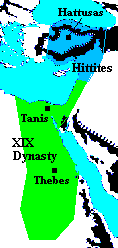| |

| Old Kingdom |
| Tudhaliya(s)? |
1740-1710 |
| Pusarruma(s)? |
1710-1680 |
| Labarna(s) I? |
1680-1650 |
c.1680-1650? |
Labarna(s) II?/
Hattusilis I |
1650-1620 |
1650-1620 |
| Mursili(s) I |
1620-1590 |
1620-1590 |
| Sack of Babylon, c.1595 |
| Hantili(s) I |
1590-1560 |
1590-1560 |
| Zidanta(s) I |
1560-1550 |
1560-1550 |
| Ammuna(s) |
1550-1530 |
1550-1530 |
| Huzziya(s) I |
1530-1525 |
1530-1525 |
| Telipinu(s) |
1525-1500 |
1525-1500 |
| Alluwamna(s) |
1500-1490 |
1500-
1430/1420 |
| Hantili(s) II |
1490-1480 |
| Zidanta(s) II |
1480-1470 |
| Huzziya(s) II |
1470-1460 |
The first column of dates at left is from O.R. Gurney,
The Hittites [Penguin Books, 1952, 1962, p.216]. The second column of dates is from Georges Roux,
Ancient Iraq [Penguin Books, 1964, 1992, pp.507-9] and/or Amélie
Kuhrt, The Ancient Near East, c.3000-330 BC [Routledge, 1995, 2000, p.230]. In the table for the "Empire" period below, Gurney, Roux, and Kuhrt have been separated into three columns, with Kuhrt's column giving alternative dates in itself. The uncertainties of Hittite dating are still so great that Kuhrt also gives the Kings in a different sequence, as can be seen from the dates.
In the earlier chronologies, there is the inconvenience that the events of the reign of Ramesses II do not match up with the corresponding Hittite dates for these events. Thus, Roux gives 1300 as the date for the battle of
Qadesh, while none of the Egyptian references has Ramesses coming to the throne before 1290. Kuhrt's latest dates allow a match for the Battle of Qadesh given with
Egyptian chronology, 1275.
The earlier histories usually give the names of the Hittite Kings with a final "s." Kuhrt drops this, without discussion. Presumably the "s" is not actually in the texts. I would imagine that when it was discovered that Hittite was an Indo-European language, it may have become customary to assume the same nominative ending that is found from Latin to Greek to Sanskrit, i.e. "s." Apparently, the custom has lapsed.
Although the Kingdom of the Hittites in central Anatolia was wiped out by the obscure migrations of the 12th century, small Hittite (nor "Neo-Hittite") states continued in
Southern Turkey, to which references to the Hittites in the Bible refer. These small states are still commemorated in the name
"Hatay" containing Antioch.
The discovery of the Hittite Kingdom and its language was an archaeological sensation at a time when the only Hittites anyone was aware of were those of the small states in the Bible. The decipherment of the Hittite language created another sensation, when it turned out to be an
Indo-European language. Even better, it was an evidently archaic dialect which contained sounds in positions that comparative theory had predicted should have been "pharyngeal" sounds (perhaps like Arabic
'ayn) in Proto-Indo-European, but which had not hitherto been found in attested languages.
| Empire |
| |
Gurney |
Roux |
Kuhrt |
| Tudhaliya(s) I |
1460-1440 |
1450-1420 |
1430/1420-
1410/1400 |
| Arnuwanda(s) I |
1440-1420 |
1420-1400 |
1390/1370-
1380/1355 |
| Tudhaliya(s) II |
|
1400/1390-
1390/1370 |
| Hattusili(s) II |
1420-1400 |
|
1410/1400-
1400/1390 |
| Tudhaliya(s) III |
1400-1380 |
1395-1380 |
1380/1355-
1370/1344 |
| Suppiluliuma(s) I |
1380-1340 |
c.1380-1336 |
1370/1344-
1330/1322 |
Defeat of Mitanni, c.1370;
reduction of Syria, supplication
from widowed Egyptian Queen
to marry a Hittite Prince, c.1340 |
| Mattiwaza ? |
| Arnuwanda(s) II |
1340-1339 |
|
1330/1322-
1330/1321 |
| Mursili(s) II |
1339-1306 |
1335-1310 |
1330/1321-
1295 |
| Muwatilli(s) |
1306-1282 |
1309-1287 |
1295-
1282/1271 |
| Battle of Qadesh, 1300 or 1286/1275 |
Urhi-Teshub/
Mursilis III |
1282-1275 |
|
1282/1271-
1275/1264 |
| Hattusili(s) III |
1275-1250 |
1286-1265 |
1275/1264-
1245/1239 |
| Egyptian-Hittite Treaty, 1286 or 1269/1258 |
| Tudhaliya(s) IV |
1250-1220 |
1265-1235 |
1245/1239-
1215/1209 |
| Arnuwanda(s) III |
1220-1190 |
1235-1215 |
1215/1209-
1210/1205 |
| Suppiluliuma(s) II |
1190-? |
1215-? |
1210/1205-? |
Phrygians & Gasgas destroy
Hittites, c.1200 |
Ironically, it was the Hittites who then brought to an end the Kingdom of the Mitanni, which may have been ruled by a noble elite with Indo-Aryan affinities, speaking or influenced by another Indo-European language from the same family as Persian and Sanskrit, and who worshiped gods obviously identical to those of the
Vedas. The Indo-Aryan influence on Mitanni had clearly come in across Iran, but where the Hittites originally came from, if not autochthonous, is as mysterious as ever.
|
|